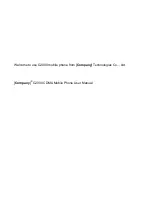
19
Personal directory (ADN)
These numbers are known as abbreviated dialling numbers (ADN). There are two types of ADN, one is the phonebook stored in the phone memory
(the phonebook (Phone)) and the other is the phonebook stored on the SIM card (the phonebook (SIM)).
Phonebook (SIM)
•
Up to 255 personal data can be stored in the SIM card.
•
Each personal data contains a phone number, a name and a location number.
2
The number of phone numbers that can be stored on a SIM card depends on the SIM card capability.
Phonebook (Phone)
Up to 500 personal data can be stored in your phone memory. Each personal data is given a location number (1 to 500), and it can be allocated to a group.
To each personal data, you can set the following:
•
7 phone numbers (Home, Mobile, Work, Data, Fax, Other phone x 2)
•
2 Email addresses
•
2 descriptive information
•
LED colour, a CLI picture and a ringer tone
2
Up to 10 phone numbers can have a voice recognition recording allocated to them.
Fixed dialling numbers (FDN)
Fixed dialling numbers are a means of limiting which numbers can be called from your phone. With the FDN feature switched on (see page 46), you can call with your
phone the numbers you have stored in this phonebook and the emergency number only.
,
Although FDN is supported by your phone, it must be present on your SIM card - check with your service provider.
Service dialling numbers (SDN)
The numbers stored in the SDN directory are pre-installed by your service provider. They will call numbers and services as agreed with your supplier (e.g. customer
enquiries, billing information, sportslines, weatherlines, etc.) and cannot be edited by you.
You will not be able to see the number which will be dialled but only the associated text title.
,
Although SDN is supported by your phone, it must be present on your SIM card - check with your service provider.
















































